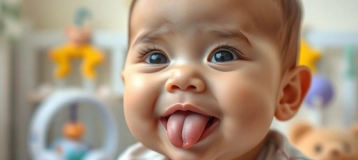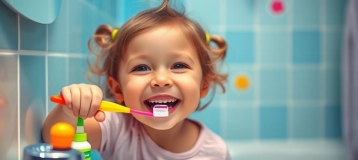Establishing a strong foundation for your child's dental health is one of the best things you can do for their long-term well-being. Good oral hygiene habits, once ingrained, can last a lifetime, preventing common issues like cavities and gum disease. This comprehensive guide provides parents with the knowledge and practical tips needed to make children’s dental care a positive and effective part of their daily routine.
Essential Habits for Healthy Teeth
A child's oral hygiene routine mirrors an adult's, focusing on consistency and prevention. Here are the core practices you should teach and enforce:
Twice-Daily Brushing: Ensure your child brushes their teeth at least twice a day, in the morning and before bed, for two minutes each time.
Nutritious Diet: Limit sugary and starchy foods and drinks. The extra saliva produced during meals helps rinse away acid-producing sugars, so it's better to serve treats as part of a meal rather than as standalone snacks.
The Power of fluoride: Ensure your child is exposed to adequate fluoride, a mineral that strengthens tooth enamel. This can come from fluoridated water, toothpaste, or, if necessary, supplements prescribed by a dentist or pediatrician.
Regular Dental Visits: Schedule a dental check-up every six months. This allows a professional to monitor their dental development, perform cleanings, and apply preventive treatments like sealants.
Emergency Preparedness: In the event of a dental injury—like a chipped, broken, or knocked-out tooth—contact your dentist immediately.
Making Brushing Fun, Not a Fight
Many parents struggle with getting their kids to brush their teeth. The key is to make it an engaging activity rather than a chore. Try these creative methods:
Involve Them: Let your child pick out their own toothbrush and toothpaste. Giving them a sense of ownership can increase their willingness to participate.
Group Activity: Brush your teeth alongside your child. When they see you enjoying the routine, they're more likely to want to join in.
Use Entertainment: Play a two-minute song or podcast, or tell a funny story while they brush. This makes the time pass quickly and turns it into a fun ritual.
Reward Systems: Use a simple reward chart with stickers. This positive reinforcement can help them build a consistent habit.
Understanding Key Milestones and Preventive Measures
Flossing: Introduce flossing as soon as your child has two teeth that touch, which is typically between 8 and 12 months of age. Flossing removes plaque and food particles that a toothbrush can't reach.
First Dental Visit: The American Academy of Pediatric Dentistry recommends a child’s first dental visit by their first birthday or when their first tooth erupts. This early visit helps the dentist check for any abnormalities and gives you a chance to get personalized advice on oral care.
Preventing "baby bottle tooth decay": This condition, known as early childhood dental caries, is caused by prolonged exposure of teeth to sugary liquids like milk, formula, or juice. To prevent it, never let your child fall asleep with a bottle in their mouth. Instead, offer water or a pacifier.
dental sealants: These are a highly effective, painless way to prevent cavities. A dentist applies a sealant to the chewing surfaces of molars, creating a barrier that protects against bacteria and food particles. Ask your dentist if sealants are a good option for your child.
Diet and Dental Health
A balanced diet is crucial for developing strong teeth. Encourage foods rich in calcium, phosphorus, and protein, such as dairy products and lean meats. While it's not necessary to completely ban sweets, it's important to limit them. When you do serve them, pair them with a meal to take advantage of increased saliva production, which helps neutralize acids.
Pro Tip
The content of the article is shared by netizens, please carefully identify it





